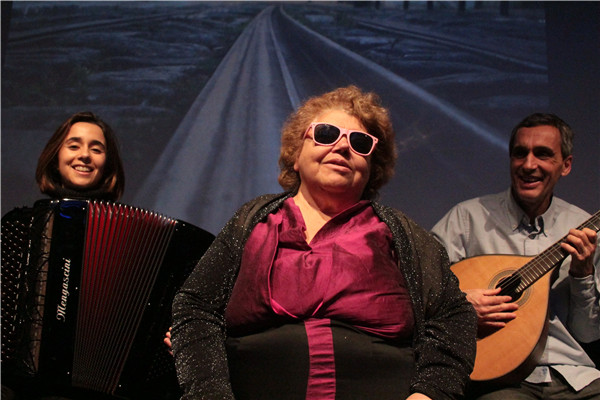 |
|
Portuguese vocalist Dona Rosa is among fado's most notable characters. [Photo provided to China Daily] |
One day in 1999, when Dona Rosa was singing in Rua Augusta, a pedestrian street in downtown Lisbon, she met the well-known Viennese artist and impresario Andre Heller, who was looking for a fado singer for a TV production of an Austrian television company.
The blind woman's singing - she made her living by performing on the street - touched Heller deeply. He invited to Rosa to participate in the TV production filmed in Marrakech. That opened the doors for Rosa's musical career - during the shooting, she met her German agent Uli Balss, who produces CDs and organizes concerts for Rosa all over the world - including her China debut next month.
The Portuguese vocalist, who has released four albums, has become one of fado's most notable performers. She is expected to give over 30 concerts worldwide this year, including Beijing on April 16 during her Hello, Destiny tour in China.
"Fado is a way of expressing our feelings from the deep of our soul. We'll invite the audiences to share and listen to the open language that comes from inside," says Rosa.
The ensemble is composed of Rosa on vocals and triangle, Raul Abreu on Portuguese guitar and vocals, and Tiago Pirralho on accordion.
The ensemble will play traditional and original songs, with the sounds of the guitar and accordion supporting the voice of Rosa. To go with the original music, the musicians have a beautiful poem written by a blind child about music, titled Cancaoo de Aliu, or Hello, Destiny.
Rosa notes that she also will perform a song titled Mudei de Olhar, which includes lyrics that mean "I change my way of seeing, I walk my way and I discover with surprise that the night began shining. During another song, titled Asa de Anjo, she will invite audiences to close their eyes "in order to see better".
Born in a poor family in 1957 in Oporto, Portugal, she lost her sight at 4 years old after falling ill with severe meningitis. Her family made a living by begging in the streets. Rosa decided to travel to Lisbon when she was 9 to go to a school for blind people.
"In my childhood, I remember looking for what I had seen in my dreams and not being able to find them when I was awake," says Rosa.
Always keen to sing, she found talent as a singer as she began singing in the street to survive.
She says that she never had a goal of being a fado singer, and she learned by herself singing in the street many hours a day. As she says, her learning process and techniques came from the school of real life.
"Sometimes I sing crying inside - by singing you are able to throw away some of the sadness," says Rosa.
Liu Zhao, founder of Stellion Era Cultural Communication, whose company promotes Rosa's upcoming China tour, says he got to know Rosa after being introduced by the traditional Tuvan group Huun-Huur-Tu. Liu has collaborated on the group's China tours since 2014.
A big fan of fado, Liu says that the music genre, which can be traced to the 1820s in Portugal and especially Lisbon. It is not a mainstream music genre, he says, but it is full of emotions, struggles and stories.
"Though Rosa has no academic background, her voice is powerful and real. We hope to introduce her music to Chinese audiences," says Liu.
If you go
7:30 pm, April 16. Tianqiao Performing Arts Center, 9 Tianqiao Nandajie (South street), Xicheng district, Beijing. 400-635-3355
chennan@chinadaily.com.cn
|
|
|
|
|
|
|
|
